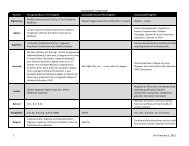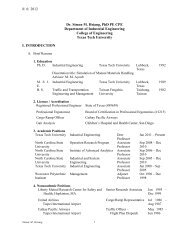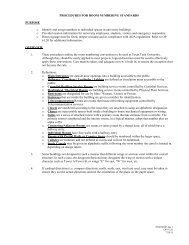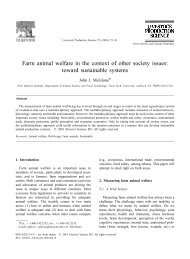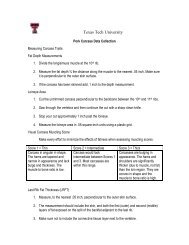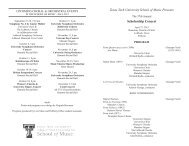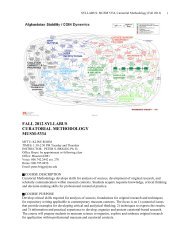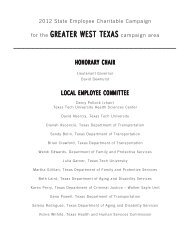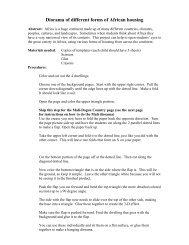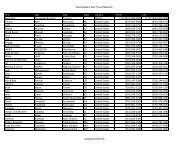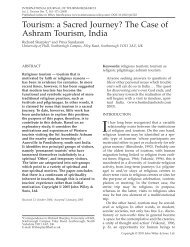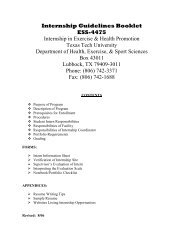Development of Tour Uriely 2005
Development of Tour Uriely 2005
Development of Tour Uriely 2005
Create successful ePaper yourself
Turn your PDF publications into a flip-book with our unique Google optimized e-Paper software.
NATAN URIELY 211<br />
The evaluation <strong>of</strong> the shift toward postmodernist or late modernist<br />
theorizing in terms <strong>of</strong> its promises and threats to future research is required<br />
as well. In this regard, one might appreciate the practice <strong>of</strong><br />
deconstruction, including the de-differentiating and the pluralizing<br />
depictions <strong>of</strong> the tourist experience, for their rising sense <strong>of</strong> sensitivity<br />
to the complexity and the diversity <strong>of</strong> tourism. Indeed, early generalizations<br />
were not sensitive to issues such as gender-related or cultural<br />
diversity. With respect to the former, for instance, Elsrud (2004) argues<br />
against the lack <strong>of</strong> gender awareness in the literature although there is<br />
so far no evidence suggesting a similarity between the ways in which<br />
men and women interpret their tourist activities.<br />
Similarly, most <strong>of</strong> the generalizing conceptualizations concern the<br />
mind <strong>of</strong> the Western tourist, while ignoring other voices, whether<br />
Japanese, Singaporean, or Brazilian (Elsrud 2004; Wang 2000). Thus,<br />
pluralizing depictions <strong>of</strong> the tourist experience, which are sensitive to<br />
gender or cultural diversity, seems to be appropriate for future research.<br />
However, the inclination <strong>of</strong> earlier theories to generalize<br />
and differentiate the tourist experience from the routine <strong>of</strong> daily life<br />
is probably part <strong>of</strong> their attempt to capture the essence <strong>of</strong> the investigated<br />
phenomenon rather than their lack <strong>of</strong> awareness <strong>of</strong> its<br />
diversity. Such a modernist attempt to track the essence <strong>of</strong> a phenomenon<br />
by generalizing is particularities aims to make sense <strong>of</strong> its diversity<br />
rather than to deny it. By turning away from this fundamental<br />
attempt <strong>of</strong> scientific practice, the recent deconstructions appear to<br />
threaten the possibility <strong>of</strong> structuring future knowledge. In this respect,<br />
the recent conceptualizations comply with the notion <strong>of</strong> postmodernist<br />
thought as a destructive perspective, which fails to<br />
elaborate sufficient alternatives for structuring knowledge (Antonio<br />
1991; Gitlin 1989).<br />
Therefore, in addition to their deconstruction in recent studies,<br />
early conceptualizations <strong>of</strong> the tourist experience need to be reconstructed<br />
in future studies. Specifically, further studies are encouraged<br />
to redefine the current distinctions between tourist and everyday life<br />
experience and to develop new typologies, which capture the logic <strong>of</strong><br />
contemporary variations. For instance, if work and tourism are currently<br />
intertwined (Pizam et al 2000; <strong>Uriely</strong> 2001; <strong>Uriely</strong> and Reichel<br />
2000), future studies should specify which types <strong>of</strong> work-related activities<br />
are incorporated in contemporary tourist experiences. Questions<br />
regarding the remaining similarities within institutionalized holidaymakers<br />
or backpackers need also to be addressed in light <strong>of</strong> recent<br />
studies, which stress the multiplicity <strong>of</strong> experiences that are available<br />
within each <strong>of</strong> these conventional categories <strong>of</strong> tourism (<strong>Uriely</strong> et al<br />
2002; Wickens 2002).<br />
The postmodernist inclination toward subjectivity is another problematic<br />
aspect <strong>of</strong> recent conceptualizations. First, it is suggested that<br />
an approach that ignores the external opportunities or constraints imposed<br />
on the individual cannot provide a complete depiction <strong>of</strong> the<br />
tourist experience. Second, the focus on subjectivity could be seen as<br />
a naive perspective, which assumes that tourism is an area <strong>of</strong> life that<br />
facilitates a real freedom <strong>of</strong> choice. In contrast to this view, it is



